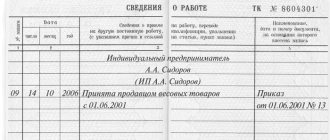The dismissal process is always unpleasant and requires clear action. A special point is the issuance of a work book upon dismissal, since this document contains all the basic data about the employee. The employer is obliged to issue the document and has no right to withhold it to the detriment of the former employee. Sometimes it happens that the manager threatens that he will not give the book back, or the employee refuses to pick it up himself because he does not agree with the dismissal.
The work book contains the entire history of a person’s working period; it will be needed in the future to calculate the length of service in the Pension Fund. Until the employment relationship ends, the employer must keep it, and upon termination of the employment contract, he must issue the document without hindrance on the last working day.
Dismissal implies the termination of all employment relations between the employee and the company and its management. The employee has the right to pick up his things and documents and finish his work in this organization.
Legislative regulations on the work book
The sample work book is legally established. The rules according to which work books are maintained, stored and issued are regulated by federal executive authorities, which are authorized to do so by the Government of the Russian Federation.
The legislative basis for handling work books is contained in the following acts:
- Decree of the Government of the Russian Federation dated April 16, 2003 No. 225 “On work books” contains the rules for maintaining and storing this document, as well as samples of the necessary forms, features of their production and distribution among employers;
- Art. 66 of the Labor Code of the Russian Federation prescribes the use of the above-mentioned Rules No. 255 to resolve issues related to work books;
- Art. 65 of the Labor Code of the Russian Federation speaks of the obligatory presence of a labor contract for concluding an agreement between an employee and an employer;
- Art. 80 of the Labor Code of the Russian Federation, dedicated to the issues of dismissal at the request of the employee, directly contains the rule on the issuance of employment and other documents related to his work on the last day in the service of the resigning employee upon presentation of a written application by the latter;
- Art. 140 of the Labor Code of the Russian Federation insists on the need for final settlement with the employee on the day of his dismissal, including regarding documents belonging to him, including the work book;
- Art. 234 covers the responsibility of the employer in the event of a violation of the employee’s right to new employment, which is impossible without a work book, if it was not issued to the dismissed person on time, and Art. 237 speaks of the possibility of compensation for moral damage for such a violation.
Certificate of average earnings to determine unemployment benefits
The reference to the certificate of average earnings is contained in clause 2 of Art.
3 of the employment law: “The decision to recognize a citizen registered for the purpose of searching for a suitable job as unemployed is made by the employment service authorities at the citizen’s place of residence no later than 11 days from the date of presentation to the employment service authorities of a passport, work book or documents replacing them, documents certifying his qualifications, certificates of average earnings for the last three months at the last place of work (service), and for first-time job seekers (who have not previously worked) who do not have qualifications - a passport and a document on education and (or) qualifications.” This certificate will help the former employee register with the employment service and receive benefits. The form of such a certificate is not approved by regulation, but there is a recommended form of a certificate of average earnings, which is given in the letter of the Ministry of Labor of the Russian Federation dated August 15, 2016 No. 16-5/B-421.
The certificate must be issued within three working days from the date of receipt of a written application from the employee (Clause 2, Article 3 of Law No. 1032-1, Article 62 of the Labor Code of the Russian Federation).
Law of the Russian Federation dated April 19, 1991 No. 1032-1
(as amended on December 11, 2018) “On employment in the Russian Federation”
Clause 2, Art. 3
Editor's note:
If the employer does not issue a certificate within three working days from the date the employee submits the relevant application, he faces liability in accordance with Art. 5.27 Code of Administrative Offenses of the Russian Federation.
What happens to the work record upon dismissal?
Legislative acts require the issuance of a work book with an entry on the termination of the employment contract to the dismissed employee on his last working day with this employer.
In some cases provided for by law, the date of dismissal is not considered the last day spent in service, but another date. This is possible if, for example, before dismissal, an employee was given previously unused vacation, after which he will be considered dismissed. In this situation, the last working day before the vacation will become the day of calculation and issuance of the work book, while the date of dismissal will be the last vacation day.
Entries made in the work book
The employer is obliged to issue the employee a work book that is properly executed. Upon dismissal, it is worth checking the following points of completion for compliance with the Rules for maintaining and storing work books:
- each entry made in the book during the time of work for this employer must be certified by the signature of the superiors (responsible person);
- Each signature must bear the seal of the organization or its human resources department;
- The signature of the employee must also be present (except in cases where the book is not issued to him or he refuses to receive it);
- records are formulated in the form prescribed by law;
- the last entry should be a record of dismissal from this organization;
- if the book was kept not only in the state language, but also in the regional one (of a republic that is part of the Russian Federation), then both texts must be certified accordingly.
NOTE! Correct wording is very important. If the previous employer made an entry “not according to the protocol”, and the subsequent one refused employment because of this, the court will side with the unfairly offended employee, which is fraught with the payment of serious compensation and compensation for lost earnings.
Material liability
Based on Art.
232 of the Labor Code of the Russian Federation, the party to the employment contract (employer or employee) who caused damage to the other party shall compensate for this damage in the manner prescribed by the Labor Code of the Russian Federation and other federal laws. An employment contract or written agreements thereto may specify the financial liability of the parties to this contract. Moreover, the contractual liability of the employer to the employee cannot be lower, and the employee to the employer – higher, than provided for by the Labor Code or other federal laws. Article 233 of the Labor Code of the Russian Federation specifies that the financial liability of a party to an employment contract arises for damage caused by it to the other party to this contract as a result of culpable unlawful behavior (actions or inaction), unless otherwise provided by the Labor Code of the Russian Federation or other federal laws.
So, by virtue of Art. 234 of the Labor Code of the Russian Federation, the employer is obliged to compensate the employee for material damage - the earnings he did not receive in all cases of illegal deprivation of his opportunity to work, including in the event of a delay in issuing a work book. The same is stated in paragraph 35 of the Rules for maintaining and storing work books: if there is a delay in issuing a work book to an employee due to the fault of the employer, or if the reason for the dismissal of the employee is incorrectly or does not comply with federal law, the employer is obliged to compensate the employee for what he did not receive during the entire delay. earnings. In this case, the day of dismissal (termination of the employment contract) is considered the day the work book is issued. An order (instruction) of the employer is issued about the new day of dismissal of the employee and an entry is made in the work book. A previously made entry about the day of dismissal is declared invalid in the manner established by the Rules for maintaining and storing work books.
For your information
The legislator believes that untimely issuance of a work book makes it impossible for a former employee to find employment in a new place; accordingly, the employee must be compensated for lost earnings.
Let us note that the points of view of the courts on the issue of collecting lost earnings during the delay in issuing a work book are divided. Some believe that the fact of a delay in issuing a work permit is sufficient for recovery. Thus, Sh. filed a claim against the LLC in the Dzerzhinsky District Court of St. Petersburg. She asked the court to oblige the defendant to change the date of dismissal to the date of issue of the work book and to recover compensation in connection with the delay in issuing the work book for seven months. Sh. wrote a letter of resignation, according to which November 28, 2014 was her last working day. On this day, Sh. was not given a book, and on February 26, 2015, she received a notification about the need to come for a work book. The employer believed that he had not committed a violation, since he sent Sh. a notice. However, the court thought otherwise. During the trial, it was established that Sh. was at work on the day of dismissal; there were no grounds for non-issuance of a work book. A notice of the need to receive a book or agree to have it sent by mail was sent to the employee on February 20, 2015, that is, after almost three months from the date of dismissal. Sh. received a work book during the consideration of the case on July 1, 2015. Since the employer did not take all measures to hand over the work book to the quitter, the court recovered compensation for the delay in issuing the work book for the period from November 28, 2014 to February 20, 2015, and also changed the date of dismissal to February 20, 2015 (Appeal ruling of the St. Petersburg City Court dated October 27 .2015 No. 33‑18051/2015).
Other courts find out whether the delay of the work record book by the employer really prevented the dismissed person from finding a new job, and make a decision depending on this. In particular, A. filed a lawsuit for the restoration of violated rights, since on the day of dismissal she was not paid and she was not given a work book. The employer refused to do this, citing A.’s debt to him. Considering the case, the court found that the employer had indeed delayed issuing the work book.
At the same time, according to the court, the legislator associates the possibility of the employer’s financial liability to the employee for the delay in issuing a work book with the guilty behavior of the employer. The court found that the employer had telephone conversations with A. about receiving the book, that is, he took measures to deliver it. And the plaintiff herself explained at the court hearing that after her dismissal she did not intend to get a job and did not make any attempts to find a job.
Refusing to collect compensation for the delay in issuing a work book, the court indicated that such a delay in itself does not indicate the deprivation of A.’s right to work due to the fault of the employer, since as a result of the latter’s actions no obstacles were created to A. concluding an employment contract with another employer and her receipt of wages. In this regard, the imposition on the employer of the obligation to compensate A. for property damage in the form of payment of earnings cannot be recognized as corresponding to the provisions of Art. 234 Labor Code of the Russian Federation.
The arguments of the complaint are that, according to Art. 234 of the Labor Code of the Russian Federation, in itself, the failure to receive a work book by the plaintiff indicates deprivation of her right to work, which means that the employer is obliged to compensate the employee for lost earnings, the court considered untenable, since they are based on a different interpretation of the current labor legislation (Appeal ruling of the Lipetsk Regional Court dated September 21, 2015 in case No. 33-2603/2015).
If, after all, the court sided with the former employee, compensation will have to be paid for the delay in issuing the book. Let us recall that the rules for calculating average earnings are set out in Art. 139 Labor Code of the Russian Federation. The Plenum of the Supreme Court of the Russian Federation in paragraph 62 of Resolution No. 2 of March 17, 2004 “On the application by the courts of the Russian Federation of the Labor Code of the Russian Federation” explained that since this norm establishes a uniform procedure for calculating the average wage for all cases of determining its size, the same procedure should be followed determine the average earnings when collecting sums of money during forced absence caused by a delay in issuing a work book to a dismissed employee (Article 234 of the Labor Code of the Russian Federation). Keep in mind that the specifics of the procedure for calculating average wages are determined by Decree of the Government of the Russian Federation of December 24, 2007 No. 922.
Who can get a work book
Usually, upon dismissal, the work book is given directly to the employee. In practice, there are circumstances permitted by law when the book can be:
- issued to the person who received a power of attorney from the employee to receive the document;
- given to a relative of the dismissed person;
- sent by mail;
- preserved by the employer in the manner prescribed by law.
Features of personal issuance
The procedure for obtaining a work record book is more labor-intensive for the employer than for the person resigning. It consists of several stages.
- Filling. It must be fully completed by the day of dismissal, and consists of two important procedures:
- certification by signatures and seals of all records made during the period of work in this organization;
- entering the wording of dismissal.
- Obtaining the employee’s signature in the required column of the personal card (indicating that he received the book in hand).
The employee has not received the book, what should I do?
If on the day of dismissal an employee does not show up to the HR department or his workplace or refuses to receive a work book, the employer needs to insure himself. The situation cannot be left to chance, otherwise a lawsuit may be filed due to the delay in issuing the work permit. The employer must:
- draw up an act stating that the work book has not been issued to the employee (indicate the reason);
- send the employee a written notification of the need to obtain a work book or agree to send it by mail.
Work book – by mail
Such an important document can only be forwarded with the written consent of its owner, that is, the employee. Such consent may be expressed:
- in advance, when the employee asks in writing to send him his work report to the specified address due to the impossibility of appearing for it in person on time;
- in response to a notice sent by the employer.
When will the book be given to relatives?
Close people of an employee can receive his work book only in one very sad case - dismissal due to death. To do this you need:
- make an entry in the book about the termination of the employment relationship;
- make sure of close family ties with the deceased, confirmed by documents (passport, marriage certificate, birth certificate, etc.);
- receive a receipt from a relative for receipt of the work permit (in a simple form).
With the written consent of relatives, you can use postal services.
Or is it still an obstacle?
However, there are also directly opposite decisions - that the employee is not at all obliged to prove the fact of the impossibility of employment due to his lack of a work book, since this circumstance is established by law. That is, the absence of a work book by an employee is in itself an obstacle to employment. (rulings of the Samara Regional Court dated March 15, 2016 in case No. 33-2471/2016 and the Supreme Court of the Republic of Bashkortostan dated September 27, 2016 in case No. 33-19280/2016).
The procedure for issuing a work book upon dismissal of an employee according to the Labor Code of the Russian Federation
An employer does not have the right to release a former subordinate with a book in which the appropriate entries have not been made. According to Art. 66 of the Labor Code of the Russian Federation, he is obliged to make entries related to changes in the position or personal data of the employee. Without this information, there will be no point in the book itself and its storage at the workplace. Also, in the absence of this information, problems may arise with the calculation and accrual of the employee’s pension.
The procedure for dismissal and receipt of a book is as follows:
- Drawing up a statement to a subordinate if he resigns of his own free will.
- If the dismissal occurs at the initiative of the manager, then a special act is drawn up.
- The management is obliged to read the application and approve the employee’s decision.
- After writing the application, a two-week work period must follow.
- On the last working day in the work record book, the manager or an authorized person (usually a personnel employee) makes an entry and endorses it with his signature and company seal.
- The employee can receive his document along with all payments due upon dismissal.
So, a record of dismissal is made in the work book on the last working day (Resolution of the Government of the Russian Federation of April 16, 2003 No. 225). It should contain the following points:
- Serial number of the record.
- Date of dismissal in the format dd.mm.yyyy.
- Grounds for termination of the contract. We remember that words are written in full, without using any abbreviations. A reference to the number, paragraph, part of the article of the Labor Code of the Russian Federation is required.
- Order details without abbreviations.
- Signatures of the authorized employee or manager and the dismissed employee. The company's seal certifying the entry made.
Until an entry is made into the employment record, it cannot be issued to the dismissed employee.
Administrative responsibility of the employer. Fines, sanctions
Failure to comply with an issued order, including violation of the deadlines for issuing or timely execution of a work book, gives the Federal Labor and Employment Inspectorate the right to bring the employer who violated the law to administrative liability. The fine for failure to issue a work book upon dismissal for a legal entity can range from 30 to 50 thousand rubles. An official, that is, a manager, or an individual entrepreneur who fails to issue a work book on time may be punished by disqualification for up to three years or a fine of 1,000 to 5,000 rubles.
But if, despite the inspection of Rostrud and the issued order, the employer does not give the work book, what should the employee do?
Dates for issuing the book
According to Art. 84.1 of the Labor Code of the Russian Federation, the calculation and issuance of labor records takes place on the employee’s last working day. There are situations when an employee does not go to work on the day of dismissal, for example, if he got sick or refused to come and pick up his work package that day.
In this case, a notice is sent to the dismissed employee with a request to pick up the document or agree to send the book by mail. From the moment the notification is sent, the manager ceases to be responsible for the delay of the book.
If the employee, having received the notice, applied for a work book, the employer must return it no later than 3 working days.
The document can be sent to the dismissed employee by mail if he has given his consent and written an application for forwarding the document.
In the event of the death of an employee, his relatives can receive a work permit by providing documents to confirm the relationship. If no one applies for the book, then the manager is obliged to keep it until required.
Application (appeal to the employer): how to write?
The application is written in free form on a standard A4 sheet. It contains the following information:
- Full name and contact information of the person making the application (employee).
- The requirement to issue the applicant with a work book in person in connection with dismissal.
- Date of application.
- Signature and transcript of the applicant's signature.
If for some reason the employee is unable to appear in person for his work book later, consent to send the document by mail can be attached to the application. The consent must indicate the address to which the work book of the dismissed employee should be sent.
The application or written request should be drawn up in two copies, one of which is handed over to the employer. On the second copy, the employer’s representative puts a note indicating receipt of the application with his signature; the employee keeps this document. If the employer's representative refuses to accept the application or leave a signature on the second copy, the written appeal should be sent to the employer's organization with notification by registered mail.
Of course, if the failure to issue a work book by the employer was the result of an error in the work of the personnel service, a simple written request will be enough to correct the situation. It’s another matter if, by retaining the documents, the employer deliberately prevents the former employee from finding employment. In such a situation, it will not be possible to solve the problem without contacting regulatory authorities or the court. What should an employee do if they intentionally do not issue a work book?
Issuance of a work book by proxy
A work book, like many other documents, can be issued not only personally, but also to an authorized person, if the relevant powers are properly formalized. This implies the proper execution of a power of attorney - a document delegating certain powers, in this case, obtaining a work book, to a specified person. This happens in cases, for example, when an employee is physically unable to pick up a document.
The power of attorney must be written in the form prescribed by law and certified by a notary.
Important! A power of attorney may be considered invalid if it does not bear the date of its preparation.
Without a date, it is impossible to determine whether a document has legal force. If the power of attorney is written without indicating its validity period, it is considered to be 1 year.
A properly executed power of attorney must contain the following information:
- The date of creation, as well as the place of drawing up, so that it is clear where and how the power of attorney will operate when its terms of office expire.
- Entered passport details of the owner and labor. Initials, date of birth and place of residence must be indicated without errors. This point is strictly checked when issuing a work book at the place of work.
- Data of the authorized person according to his passport. The information will also be checked, and the company will make a record of who exactly took the former employee’s work book.
- Powers of a trustee. It is important to indicate what it has the right to, for example: check the presence of all the necessary entries in the document, take the work book with you, collect the salary, etc.
- Sample signature of the person who will act on behalf of the former worker.
- The principal must sign this document to certify its authenticity.
After receiving the work book, the attorney must write a receipt to the HR department employee or other authorized person confirming receipt of the document.
IMPORTANT! When receiving a work book by power of attorney, the personnel officer who issued the document must make a note with reference to the power of attorney in the personal card and the statement of the dynamics of work books.
Not all employers agree to issue employment documents by power of attorney, since the law does not specify such a method in relation to this type of document. You can refer to Art. 185 of the Civil Code of the Russian Federation, which specifies the general provisions on the power of attorney. If you cannot obtain the consent of the manager, then you can agree to receive the work book by mail.
Where can I restore my employment?
But there are also very difficult cases. For example, the employer does not hand over the work book, and the organization in which the employee worked ceases to exist, that is, is liquidated. Difficulties arise if it is impossible to establish the whereabouts of the former manager. Over time, it may be possible to find the unscrupulous employer and return the lost document. But in order to be hired for a new job or calculate work experience, the employee will need to draw up and receive a duplicate of the work book. How to confirm existing experience and who has the right to issue a duplicate document?
First of all, the employee will have to obtain documents confirming his existing experience, continuous and general. Such documents may be:
- Certificates from the Social Insurance Fund and the Pension Fund branch confirming the availability of social contributions and pension contributions during these periods.
- Certificates, copies of personnel administrative documents (orders) from previous places of work, including information from archival organizations.
Based on supporting documents, information about the employee’s past work activity is entered into the duplicate. Who has the right to issue such a duplicate? According to the currently existing Rules, the employee must apply for a duplicate at his last place of work. But what to do when it is the last employer who is to blame for the loss of his employee’s documents, and it is not possible to find him?
If an employee plans to find a new job, then the new employer has the right to draw up and issue a new work book and indicate information about the length of service based on supporting documents. In the new work book, issued to replace the lost one, the total length of previous work experience is entered in total, but without specifying the periods of work, indicating the positions of the employee and previous employers.
Example of a power of attorney
POWER OF ATTORNEY to receive a work record book
Yekaterinburg city
the eleventh of February two thousand seventeen
I, Antonina Rostislavovna Perestukina, born on October 14, 1978, passport 20 11 No. 452678, issued by the Department of the Federal Tax Service of Russia for the Moscow Region in Pushkino on July 14, 2000, living at the address: Ekaterinburg, st. Academician Postovsky, 18, apt. 134, by this power of attorney
I AUTHORIZE
Maxim Anatolyevich Zheleznyakov, born on August 18, 1980, passport 20 11 No. 967389, issued by the Department of the Federal Tax Service of Russia for the Moscow Region in Kolomna on January 29, 2004, residing at the address: Ekaterinburg, st. Bauman, 24, apt. 91:
- obtain from the HR department of the limited liability company “Felicita” (Ekaterinburg, Vasily Eremina St., 12, office 2) the work book that belongs to me;
- ensure proper execution and entry of records formulated in accordance with the law;
- perform other necessary actions related to this instruction.
This power of attorney has been issued for a period of three months without the right of substitution.
Principal /Prestukina/ Perestukina Antonina Rostislavovna
On February eleventh, two thousand and seventeen, this power of attorney was certified by me, Anton Stepanovich Dobrodeev, a notary of the city of Yekaterinburg. This power of attorney was signed by the principal in my presence. Personality gr. Perestukina A.R. established, capacity verified.
Notary /Dobrodeev/ A.S.Dobrodeev
M.P.
Information on forms SZV-STAZH, SZV-M: what the law says
The obligation to issue information about length of service is specified in clause 4 of Art.
11 of Law No. 27-FZ: “On the day of dismissal of the insured person or on the day of termination of a civil contract for compensation in accordance with the legislation of the Russian Federation on taxes and fees or Federal Law of December 15, 2001 No. 167-FZ “ “On compulsory pension insurance in the Russian Federation”, insurance premiums are calculated, the policyholder is obliged to transfer information about the insurance period to the insured person.” The period for which the policyholder is obliged to transfer information to the insured person in the SZV-M form is not established by law (clause 4 of article 11 of Law No. 27-FZ).
Federal Law No. 27-FZ dated 04/01/1996
(as amended on 07/29/2018) “On individual (personalized) accounting in the compulsory pension insurance system”
(as amended and supplemented, entered into force on 01/01/2019) P. 4 tbsp. eleven
Responsibility for delay in issuing labor
There are unscrupulous employers who do not comply with the law, who blackmail their subordinates, intimidate them by not issuing a work book, and retain an important document without having any rights. These actions will lead to the fact that the resigning citizen will lose the document in which his length of service is recorded. He may also have difficulty finding a new job.
An employee who has suffered from such actions has the right to file a lawsuit against the employer, which may include the very fact of threats on his part regarding the withholding of a document without good reason. Upon consideration of the complaint, the manager will be forced to return the document with the relevant records. In addition, it may be recognized that the dismissal was outside the scope of the law if the employee did not leave his position of his own free will. Then he will be reinstated to work in the company where he was registered. The manager will have to compensate the employee for material and moral damage, as well as reimburse all legal expenses if the court makes such a decision.
Attention! If the employer delays issuing the work permit for a long time, then administrative liability is established by law.
The longer the manager delays issuing the document, the more he will have to pay. According to Art. 5.27 of the Code of Administrative Offences, the fine can be set in the following amounts:
- Officials - 1000-5000 rubles.
- Entrepreneurs without legal entity formation - 1000-5000 rubles. or suspension of activities for up to 90 days.
- Legal entities - 30,000-50,000 rubles. or suspension of activities for 90 days.
Section 3 of the calculation of insurance premiums is issued from the beginning of the quarter to the date of dismissal
The need to provide the specified document is established in clause 2.3 of Art.
11 of the law on persuescheta: “On the day of dismissal of the insured person or on the day of termination of the GPC agreement, the remuneration for which is in accordance with the legislation of the Russian Federation on taxes and fees or the Federal Law of December 15, 2001 No. 167-FZ “On compulsory pension insurance in Russian Federation" insurance premiums are calculated, the policyholder is obliged to transfer information to the insured person." Such information is the information reflected in section 3 of the DAM. The form for calculating insurance premiums was approved by Order of the Federal Tax Service of the Russian Federation dated October 10, 2016 No. ММВ-7-11/ [email protected] In section 3 you need to indicate information about the employee for the reporting period in which he quit, that is, from the beginning of the current quarter to the date dismissals.
If, according to personalized accounting information, it is necessary to provide extracts, that is, only parts of the SZV-M and SZV-STAZH documents relating to a specific resigning employee, then section 3 of the DAM is issued to the employee in the form of a copy of the document. The reason is that this section is compiled separately for each insured person. Therefore, upon dismissal (termination of the GPA), Section 3 with data on payments and contributions accrued in the quarter of dismissal must be printed for the insured and certified by the manager.
Federal Law No. 27-FZ dated 04/01/1996
(as amended on 07/29/2018) “On individual (personalized) accounting in the compulsory pension insurance system”
(as amended and supplemented, entered into force on 01/01/2019) P. 2.3 art. eleven
Editor's note:
Sanctions for late provision or refusal to issue documents - in accordance with Art. 5.27 Code of Administrative Offenses of the Russian Federation.
If an employee cannot pick it up in person: what to do?
If it is not possible to pick up your work permit on the last day, or you simply forgot to do so, you can get it in two ways described below.
Sending by mail
If the employee has not picked up his work book, the employer informs him in a registered letter that the work book is in his possession and needs to be picked up. He also asks for consent to send the document by mail.
When a registered letter reaches the addressee, a notification of receipt is received. But even if there is no reaction, the former place of work is required to keep the work book until they come for it.
The employer should retain notice of the employee's receipt of his registered letter as this will protect his interests if a dispute arises. Unscrupulous employees may deliberately not pick up the work permit in order to later sue and demand compensation and moral damages for the delay in issuing the document.
We also recommend making a list of the attachment, which is certified by post office employees, where you indicate that you are sending the employee a request to appear for the work book or to agree to send it by mail. There are often cases when in court an employer presents a notification of delivery, to which the recipient states that he received the letter, but it did not contain a requirement - instead, a blank sheet or postcard was enclosed. If there is an inventory, there is no way to cheat...
If the employee has expressed his consent to sending by post, the work report must be sent within 3 days from the date of receipt of consent.
Sending a work book by mail without obtaining the employee’s consent is a gross violation of the law. Such actions can be challenged in court or a complaint can be filed with the prosecutor's office.
Issuance to a representative by power of attorney
Choose from among your acquaintances a person you trust. Take him to the notary. Don't forget to take your passports with you.
The notary will draw up a power of attorney on a special form on your behalf to the representative. In general, the notary office must issue the power of attorney correctly, but it’s better to check just in case:
- Correct filling of your personal data and information about the principal. An error in even one digit will invalidate the document.
- Formulation of the representative's powers. It happens that inexperienced notaries incorrectly list the terms of reference, which is why representatives cannot perform the actions that the principal asked them to do.
- Duration of the power of attorney. There are no “enduring” powers of attorney. Think carefully about how long to write out the power of attorney, because if a representative comes to pick up the book after its expiration, the employer simply will not issue the work permit and he will be right.
- Presence of signatures of the principal, representative, notary. Each person must endorse the document as his or her consent, and the notary must endorse the document as evidence of the free expression of the will of the parties.
In addition to the signature, the notary must also put a stamp.
Issuance to relatives
It is also carried out by notarized power of attorney. Based on the provision of documents confirming relationship alone, the employer is not obliged to issue a work book to his former employee. This is only possible if the former employee has died.








